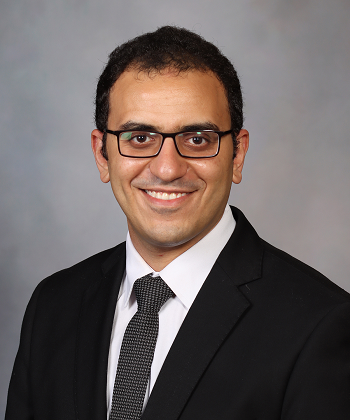2022-2023 VCRC-VF Fellow
Vasculitis Clinic, Division of Rheumatology Mayo Clinic Rochester, Minnesota
Mohanad M. Elfishawi, MBBCh, MS, began his one-year Vasculitis Clinical Research Consortium (VCRC)-Vasculitis Foundation (VF) Fellowship on January 1, 2022. Dr. Elfishawi will be working on several projects in giant cell arteritis (GCA) including investigating metabolic risk factors for GCA. In addition, he plans to study aortic involvement in patients with GCA and the risk of developing an aortic aneurysm or dissection (when a tear occurs in the inner layer of the aorta).
GCA is a form of vasculitis that can restrict blood flow and damage vital organs and tissues. Also previously called temporal arteritis, GCA typically affects the arteries in the neck and scalp, especially the temples. It can also affect the aorta and its large branches to the head, arms and legs. GCA is the most common form of vasculitis in adults over the age of 50.

Dr. Elfishawi completed his medical training at Kasr Al Ainy School of Medicine, Cairo University, in Egypt. He holds a master’s degree in rheumatology and finished his internal medicine residency training program through the Icahn School of Medicine at Mount Sinai-Queens Hospital in New York where he also served as chief internal medicine resident. Dr. Elfishawi is currently Assistant Professor of Medicine, Division of Rheumatology, Department of Internal Medicine, at the Mayo Clinic College of Medicine and Science in Rochester, Minnesota.
“I have been interested in vasculitis since starting my rheumatology training in Egypt in 2012,” Dr. Elfishawi said. “And for the past decade, I have been caring for patients with vasculitis and am fascinated by the disease process.” Dr. Elfishawi has been personally motivated to help patients with vasculitis because he feels there aren’t enough medical providers caring for these patients.
The VCRC-VF Fellowship will give Dr. Elfishawi structured training and exposure to all the patients with vasculitis. “The Foundation also has patient advocacy programs and meetings where I can meet with patients and hear from them outside the clinic office,” he added. “I will become more familiar with the infrastructure so that I can help advocate for my patients.”
The Mayo Clinic has world experts in the field who will guide Dr. Elfishawi during his fellowship. His goals are to expand his exposure to patients with vasculitides to prepare himself for independent practice caring for vasculitis patients, further build an academic portfolio that will help him manage a vasculitis center of excellence, and also provide medical training and education for rheumatologists with interest in vasculitis. His long-term career plans are to continue practicing rheumatology in an academic center where he can subspecialize in vasculitis, care for patients, and collaborate with other institutions in research and clinical trials.”
Kenneth J. Warrington, MD, is Dr. Elfishawi’s mentor and has supported him during the process of becoming a fellow. “Dr. Elfishawi’s interest in vasculitis began in his home country of Egypt where he cared for patients with Behçet’s disease and then pursued translational research in this disease,” Dr. Warrington explained. “He is energized by the interesting aspects of evaluating patients with vasculitis, and is comfortable managing complex diseases. He has shown excellent capacity for collaborative work, and he has taken great initiative in planning his research in vasculitis.”
Dr. Warrington is a consultant and serves as Chair in the Division of Rheumatology, Department of Internal Medicine at Mayo Clinic and is Director of the Vasculitis Subspecialty Group. He is also Professor of Medicine, Mayo Clinic College of Medicine and Science.
Having the skills, enthusiasm, and drive to succeed in his endeavors, Dr. Warrington is confident of Dr. Elfishawi’s ability to pursue a career in academic rheumatology, with focus on vasculitis. “It is truly an honor for me to mentor such a motivated clinical researcher, and the VCRC-VF Fellowship will be a valuable addition to his training,” Dr. Warrington noted.
